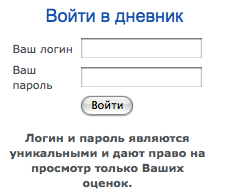ULYANOVSK, Russia | For many years, Russian schoolchildren have concealed bad grades from their parents with the help of a classic excuse: “My grade report book (i.e. report card) was taken to be checked.” It will no longer work. Many Russian parents now have the possibility to check up on their child’s progress without ever having to leave home or meet with teachers, through the Internet and modern mobile technology.
In July 2008, at a meeting of the State Council Presidium considering the development of an information society in the Russian Federation, President Dmitrii Medvedev suggested the creation of electronic school registers and online report cards in addition to paper versions. Since the beginning of this school year, the experiment has been conducted in Moscow, Krasnoyarsk, Stavropol and several other Russian cities. One of the most comprehensive programs was launched in the city of Ulyanovsk, around 900 km east of Moscow. As the fall term draws to an end, the new system’s initial effects are being evaluated.
According to representatives of the Department of Education in Ulyanovsk, 89 city schools have chosen to participate. At a press conference for the project “Electronic School Registers”, Ludmila Solomenko, head of the Department of Education, noted that electronic technology stands to play a greater role in Ulyanovsk’s schools in the future. “If the project is successful [in the city], this innovation will also be brought to village schools in the Ulyanovsk region,” she added.
The electronic register is a paid service, but parents are being asked to sign up for it only on a voluntary basis. For around 60 rubles (just over 2 USD), parents receive a login and a password unique to every pupil. They can access the electronic register at the website “Simbirsk Catalogue” a hyperlocal site on community life in the Ulyanovsk region (Simbirsk was renamed Ulyanovsk in 1924). The site also hosts pages for participating schools listing their teaching staff, courses, events and news, and allows users to rate the school’s sites.
“It is very simple to use: all parents have to do is to agree to a contract with the private company which is in charge of carrying out the project, and they get all the necessary information through their mobile phones or computers,” says Svetlana Chikunova, a school accountant. Half of the 60 ruble fee goes to the school as a form of supplementary income and half goes to the company that offers the electronic service.
It is certainly true that not every Russian parent today has access to the Internet, or sufficient skills to navigate the system. However, as the project leaders predict, the program may help to improve the computer literacy of adults. As of now, around 500 parents in Ulyanovsk have signed up.
“The idea is very nice,” says Larisa Ivanovna, the mother of an eighth-grader, Nastya, with a smile. “At this age, children are sometimes reticent about their successes and failures in school. But now parents are informed about their children’s results [without having to ask them]. The information is secure, and teachers are learning how to use these innovative techniques together with us.” Parents who frequently have to spend time away from their children as a result of business trips also find it a useful tool for monitoring their children’s progress.
The electronic registers caused quite a stir among schoolchildren, themselves. “I think it’s an awful idea. It distrusts the child and puts pressure on the student!” declared 15 year-old Stas indignantly. But many students admit that this “system of shadowing and supervision” fosters a greater sense of responsibility in them.
Homeroom teachers of every class fill in paper registers and deliver them to the school secretary, who in turn uploads the data to the Internet. Though the project is still in its initial stages, already the lack of coordination at the level of reporting has been pointed to as a major flaw. Some see it as causing twice as much administrative work for teachers. “The electronic register was to supposed to save us from paperwork,” complains Elena H., a math teacher in one of the city schools. “Instead of that we have to fill in a pile of paper registers. I spend several hours every day doing this “double work”. And I get no extra payment for this.”
It is too early to tell what the impact of the project will be, though it is a step toward realizing Russia’s goal of developing into an information-oriented society. The real benefits and disadvantages of the project will be determined at the end of this school year, when the project moves from the testing stage to a formalized procedure in Ulyanovsk’s schools.
This article was produced as an assignment for the “Improving Coverage of Education Issues” online distance learning course organized by TOL and developed in cooperation with the Guardian Foundation and the BBC World Trust, enabled by the generous support of the Open Society Institute Education Support Program.

